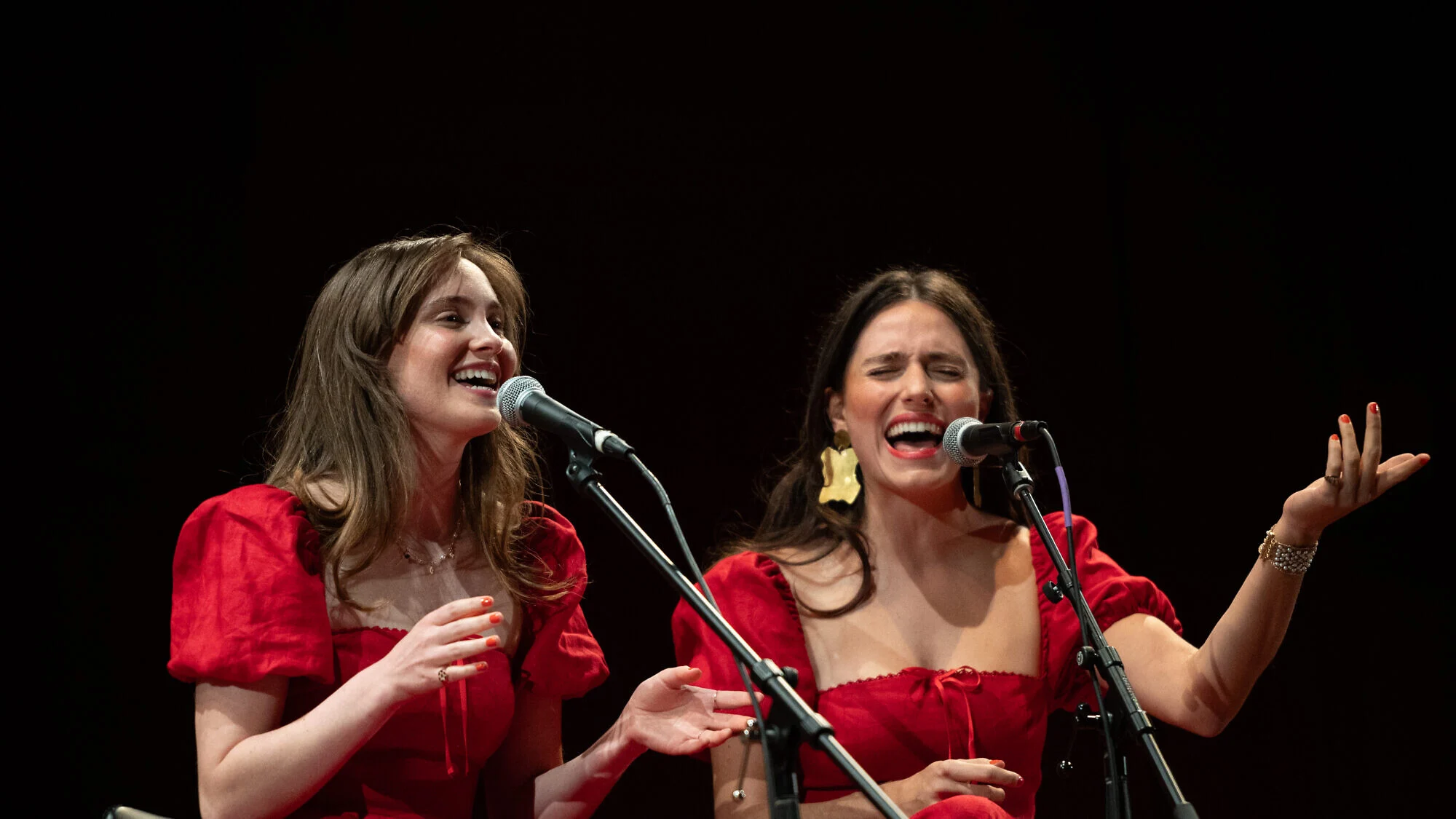this week’s verse
דערפאַר איז קראַנק אונדזער האַרץ, איבּער דעם זענען פינצטער אונדזערע אויגן (איכה ה י”ז)
transliterated
derfar iz krank undzer harts, iber dem zenen fintster undzere oygn
in English
For this our heart is faint, for these things our eyes are dim (Lamentations 5:17)
in Hebrew
עַל־זֶה הָיָה דָוֶה לִבֵּנוּ עַל־אֵלֶה חָשְׁכוּ עֵינֵינוּ (איכה ה יז)
and this
זײַט דאָס בּית־המקדש איז חרוב געוואָרען, קען קײַן שמחה ניט פאַרפולטזײַן .
transliterated
zayt dos beys hamikdosh iz khorev gevorn, ken kayn simkhe nit farfult zayn
in English
Since our temple was destroyed there can be no complete happiness
in Hebrew
מיום שחרב ביהמ”ק, אין שמחה מלאה בעולם
וואַרפן שישקעס
תּשעה בּאב בּעת קינות זאָגען אין קאָזשניצער מגיד‘ס בּית־המדרש זענען אַרײַנגעקומען אַ חברהיונגע שפּיצלינגערס און האָבּן אָנגעהויבּן װאַרפן אויף דעם עולם מתפללים, אויסגעטוענע שיך,מיט שישקעס, װי ס׳איז דער מנהג אין טײל מקומות. זענען עטלעכע חסידים געװאָרן אין כּעס אויף דער חוצפּה און הפקרות פון די יונגע חברה און האָבּן זײ אָגגעהויבּן אַרויסטרײַבּן פוןבּית־המדרש. האָט דעד מגיד זיך געוואָנדן צו די װאָס האָבּן די יוגגװאַרג געטריבּן און געזאָגט:אויבּ דער רבּונו של עולם איז נישט ניחא אונדזער התנהגות אין תּשעה בּאב, האָט ער אַ בּרירה,זאָל ער אים אינגאַנצן צונעמען פון אונדז…
varfn shishkes
Tishebov b’eys kin’es zogn in kozhnitser beys medresh, zenen arayngekumen a khevre yunge shpitslingers un hobn ongehoybn varfn af dem oylem mispalelim, oysgeto’ne shikh, mit shishkes, vi s’iz der minheg in teyl mekoymes. zenen etlekhe khasidim gevorn in kas af der khutspe un hefkeyres fun di yun’ge khev’re un hobn zey ongehoybn aroystraybn fun beys medresh. hot der magid zikh gevondn tsu di vos hobn di yungvarg getribn un gezogt, “oyb der Ribono shel Olom iz nit ni’khe undzer hisna’ges in Tishebov, hot er a brey’re, zol er em ingantsn tsunemen fun undz…”
throwing cones
On Tisha B’av, while they were saying the Kinnos*, a group of young pranksters came into the shul of the Kozhnitzer Magid and started throwing at the worshippers, who were not wearing any shoes, with cones of conifer (thorny acorns), as was the custom in some circles. Some of the Chassidim became upset of the chutzpa and recklessness of these youngsters and began chasing them away. The Maggid turned to those that were chasing them out saying, “If G-d doesn’t like our behavior on Tisha B’av, he has an option, to totally remove it from us….”
זריקת קונוסים
בתשעה באב בשעת אמירת הקינות בבית מדרשו של המגיד מקוז‘ניץ, נכנסו כמה צעירים קונדסים והתחילו לזרוק על קהל המתפללים שישבו על הריצפה בלי נעליים, קונוסים של כוניפאר(עצי מחט), כמנהג כמה מקומות. החסידים כעסו על החוצפה וההפקרות של הצעירים האלה והתחילו לרדוף אחריהם כדי לזרוק אותם מבית המדרש. המגיד פנה לאלה שניסו לסלק את הצעירים, באומרו, ”אם ההתנהגות שלנו לא מוצאת חן בעיני הרבונו של עולם, יש לו ברירה, לקחת את זה לגמרי מאתנו…”
מבטל מאַכן די תּעניתים
װען איך װאָלט געװען בּכּח, װאָלט איך בּטל געמאַכט אַלע תּעניתים חוץ יום כּפור און תּשעה בּאב,װײַל יום כּפּור, װער דאַרף אין אַזאַ הײליקן טאָג עסן, און תּשעה בּאב — װער קען דען אין אַזאַטרויעריקן טאָג עסן? (אוהב ישראל).
mevatl makhn di ta’neysim
ven ikh volt geven bekoyakh, volt ikh botl gemakht a’le ta’neysim khuts fun Yom Kiper un Tishebov, vayl Yom Kiper, ver darf in aza heylikn tog esn un Tishebov, ver ken den in aza troyrikn tog esn?”
cancel the fast days
If I had the ability, I would annul all of the fast days except Yom Kippur and Tisha B’av, because on Yom Kippur, who wants to eat on such a holy day and on Tisha B’av, who can eat on such a sad day…. (Ohev Yisroel of Apte)
לבטל את התעניות
לוּ הייתי יכול, הייתי מבטל את כל התעניות חוץ מיום כפור ותשעה באב. כי ביום כפור מי יכול לאכול ביום קדוש כזה ובתשעה באב, מי מסוגל לאכול ביום עצוב כזה… (אוהב ישראל)
תּשעה בּאב געפאַלט אום מוצאי שבּת
אַז אַ יום טוב פון די שלש רגלים פלעגט אויסקומען מוצש״ק, האָט ר׳ נפתּלי ראָפּשיצער זיך צוגעאײַלט מיטן זינגען זמירות בּײַ שלש סעודות, צוגעיאָגט דאָס בּענשען, האַלטענדיג דעם כּוס פון בּרכת המזון האָט ער געזאָגט: שבּת, שבּת, דו בּיסט טאַקע אַן אורח הגון, אַ שאָד דײַןאַװעקגײן, עס װאַרט אָבּער אין דרויסן גאָר אַ חשוב׳ער גאַסט װאָס קומט בּלויז דרײַ מאָל אין יאָר,מוזטו, זשע, מיר מוחל זײַן און אַװעקגײן און אַרײַנלאָזן דעם אורח, דעם יום טוב.
װען תּשעה בּאב איז אויסגעפאַלן מוצש״ק, פלעגט דער ראָפּשיצער מאריך זײַן בּײַ שלש סעודות,אויסגעשלעפּט די זמירות, זאָגנדיג: , — שבּת, דו בּיסט בּײַ מיר אַ טײַערער גאַסט, אַ שאָד װאָס דו גײסט אונדז פאַרלאָזן. תּשעה בּאב, דו קענסט װאַרטן אין דרויסן, הלואי װאָלסטו קײנמאָל נישטגעקומען, בּיסט בּײַ מיר נישט קײַן יחסן און אודאי נישט פון די חשוב‘ע אורחים….”
Tishebov gefalt um motsey Shabes
az a yontif fun di sholosh regolim flegt oyskumen motsey Shabes, hot R’ Naftoli Ropshitser zikh tsuge’aylt mitn zingen zmir’es ba shaleshudes, tsu’geyogt dos bentshn, haltendik dem koys fun birkas hamozn, hot er gezogt: “Shabes, Shabes, du bist ta’ke an oyrekh hogn, a shod dayn avekgeyn, es vart ober in deroysn gor a khoshever gast, vos kumt bloyz dray mol in yor, muztu, zhe, mir moykhl zayn un avekgeyn un araynlozn dem oyrokh, dem yontif.
ven Tishabov iz oysgefaln motsey Shabes, flegt der Ropshitser ma’rikh zayn ba Shaleshudes, oysgeshlept di zmi’res, zogendik, “Shabes, du bist ba mir a tayerer gast, a shod vos du geyst undz farlozn. Tishabov, du kenst vartn inderoysn, ha’levay voltstu keynmol nit gekumen, bist ba mir nit kayn yakhsn un a’va’de nit fun di khosheve orkhim…”
Tisha B’av that begins Saturday night
When A Yom Tov, one of the three festivals, would begin on a Saturday night, Rabbi Naftali of Ropshitz would rush with the Zmiros* at the Shaleshudes* meal, hurry the Grace after Meals, while holding the wine cup, saying, “Shabbos, Shabbos, you are a well respected guest, it’s sad that you’re leaving, but outside awaits a great guest that shows up only three times a year, you must forgive me and leave and allow the guest to come in, the Yom Tov.
When Tisha B’av would commence on Saturday night, Reb Naftali would prolong the Shaleshudes, stretch the Zmiros, saying: “Shabbos you are my cherished guest, it’s a pity that you are leaving us. Tisha B’av, you can wait outside. I wish you would never come. You are not privliged by me and definitely not a special guest….”
תשעה באב שמתחיל במוצאי שבת
כשאחד מן השלוש רגלים היה חל במוצאי שבת, היה ר‘ נפתלי מרופשיץ מזדרז עם הזמירות בסעודה שלישית, מיהר לברך ברכת המזון וכשהוא החזיק את הכוס יין ביד אמר: ”שבת,שבת,את אורחת הגונה, חבל שאת מסתלקת, אבל מחכה לנו בחוץ אורח חשוב מאד שבא אלינו רק שלוש פעמים בשנה. את חייבת לסלוח לי ולעזוב שנכניס את האורח, היום טוב.”
כשתשעה באב חל במוצאי שבת, הוא היה מאריך בסעודה שלישית ומושך את הזמירות תוך כדי אמירה: ”שבת את אורחת יקרה מאד אצלי וחבל שאת הולכת לעזוב אותנו. תשעה באב, אתה יכול לחכות בחוץ, הלואי שלא היית בא בכלל. אצלי אתה בכלל לא יחסן ובטח לא אורח חשוב….”
*Zmiros are Jewish hymns, usually sung in the Hebrew or Aramaic languages, but sometimes also in Yiddish or Ladino. The best known zemirot are those sung around the table during Shabbat and Jewish holidays. Some of the Sabbath zemirot are specific to certain times of the day, such as those sung for the Friday evening meal, the Saturday noon meal, and the third Sabbath meal just before sundown on Saturday afternoon. In some editions of the Jewish prayerbook (siddur), the words to these hymns are printed after the opening prayer (kiddush) for each meal. Other zemirot are more generic and can be sung at any meal or other sacred occasion.
*Seudah shlishit or *Shaleshudes, the third meal, customarily eaten by Sabbath-observing Jews on Shabbat (observed on Saturdays). It is also known as shalosh seudos (“three meals”) in reference to an aggadic passage from the Talmud.
According to Halakha, the meal is to be eaten in the afternoon. It is usually the smallest of the three meals, often consisting of foods such as salads and gefilte fish in Ashkenazi custom and tuna, harissa, and fruits in Mizrachi and Sephardi customs.
It has special significance because it is a mitzvah (“commandment”) to eat three meals on the Sabbath. In Hasidic communities, this mitzvah is carried out with great enthusiasm. In some Hasidic circles, this third meal continues hours after the Sabbath has officially ended. The lights might be turned off, either by a timer, or by a person after the Sabbath has ended. Some have a custom to rise and “accept the Kingdom of Heaven”, by reciting “Hashem melech, Hashem malach, Hashem yimloch l’olam va’ed!” (The Lord is King, the Lord was King, the Lord will always be King) and “Hear Israel, the Lord is our God, the Lord is One” (Sh’ma Yisrael, Hashem Elokeinu, Hashem Echad).
Special Sabbath songs that are often sung at this meal include Bnei Heichala (a Kabbalistic hymn by Rabbi Isaac Luria), Mizmor L’David(23rd Psalm), and Yedid Nefesh (a piyyut, or liturgical poem, composed by 16th century Kabbalist Rabbi Eliezer Azikri). Some also finish the morning hymn Baruch Hashem Yom Yom, starting either from the words B’vo’o M’Edom or Y’tzaveh Tzur Chasdo. Many recite the “Acceptance of the Kingdom of Heaven” before the last verse of this hymn. Some sing other Sabbath morning hymns, and some Kabbalistic hymns for the third meal, such as Kel Mistater.
*Kinnos, are dirges (sad poems) or elegies traditionally recited by Jews on Tisha B’Av to mourn the destruction of both the First and Second Temple in Jerusalem and other tragedies in Jewish history, including the Crusades, the Expulsion of Jews from Spain and the Holocaust. The kinnot are recited on the night of Tisha B’Av after reciting the Book of Lamentations, which was also called “Kinnot” in the Talmudic era (see, e.g., Bava Batra 14b) before it assumed its more familiar name of “Eichah.”




